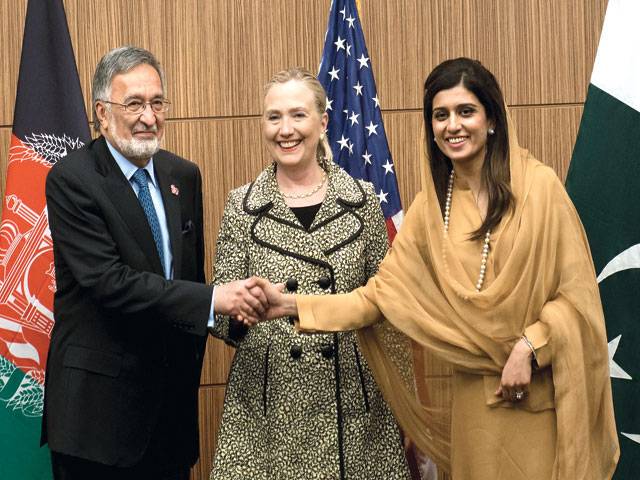TOKYO - Hillary Clinton expressed the hope Sunday that Pakistan’s recent reopening of Nato supply lines into Afghanistan might lead to a broader rapprochement in US-Pakistani relations after a difficult period for the reluctant allies.
After attending a 70-nation Afghan aid conference in Tokyo, the US Secretary of State met privately with Pakistani Foreign Minister Hina Rabbani Khar to discuss reviving the relationship, which has suffered a series of crises but is still seen as critical, particularly for the stability of South Asia.
In her first face-to-face meeting with Hina since the two countries last week struck a deal to reopen key Nato supply routes, Hillary said the United States and Pakistan are putting past tensions behind them to focus on the future. She said she had ‘a broad-ranging discussion’ with her Pakistani counterpart on some of the issues surrounding the reopening of border routes during their one-hour meeting.
She said: “We are both encouraged that we’ve been able to put the recent difficulties behind us so that we can focus on the many challenges still ahead of us, and we want to use the positive momentum generated by our recent agreement to take tangible, visible steps on our many shared core interests,” she said.
Hillary stressed that her talks with Hina “focused on the necessity of defeating the terror networks that threaten the stability of Pakistan and Afghanistan” as well as Afghan reconciliation efforts. “We also discussed economic support and the goal of moving towards more trade then aid as part of our economic relationship.”
However the US top diplomat acknowledged that ties between the two wary allies would still be tested in the future. “Obviously there’s a lot of follow-up work that has to be done. I’ve said a number of times that this is a challenging and essential relationship. It remains so. And I have no reason to believe it will not continue to raise hard questions for us both.”
Hillary and Hina met alone for about an hour, according to a US official who asked not to be named, adding that the meeting was a sign of the “intensity of her engagement”. The pair later joined Afghan Foreign Minister Zalmai Rassoul for three-way talks, and committed to work together for an ‘inclusive Afghan peace’.
In a joint statement following their talks, the trio called on Taliban fighters to join Afghan reconciliation efforts. They said the “great effort and sacrifice by the people of Afghanistan, Pakistan, the United States and the international community has decimated al-Qaeda’s core leadership in the region“, reducing the threat to peace and security that led the international community to intervene in Afghanistan in 2001.
They are backing an inclusive Afghan reconciliation process “through which individuals and groups break ties with international terrorism, renounce violence, and abide by Afghanistan’s constitution” because they say that is the surest way to lasting security for Afghanistan and the broader region.
The killing of the soldiers, coupled with a US raid on the Pakistani compound of al-Qaeda leader Osama bin Laden in May 2011, plunged relations to new lows. Then in November 26 Pakistani soldiers were martyred at Salala checkpost in Nato airstrike, which Pakistan insists was intentional and the country responded by blocking the US-led western military alliance’s supplies into Afghanistan.
The blockade forced the US and its allies to rely on longer, more costly routes through Central Asia, Russia and the Caucasus. But last week, Hillary paved the way for Islamabad to agree to reopen the vital routes by saying Washington was sorry for those deaths. As part of the new deal, Washington also pledged to release about $1.1 billion to the Pakistani military from a US coalition support fund designed to reimburse Islamabad for the cost of counter-insurgency operations.
“The fact that the GLOCS (general lines of communication) were closed was getting in the way of a lot of conversations. Now the GLOCS are open it seems to be that we have an opportunity to go back into business with them,” the senior US official told reporters.
But Washington has repeatedly called on Islamabad to do more to prevent it being a haven for militant leaders. And, Pakistan remains angry about US drone strikes that have killed hundreds of civilians so far; thus, fuelling US haltered among the countrymen, besides bringing pressure on the civilian and military authorities in the country.
On Sunday, as the Hillary and Hina talked in Tokyo a long march arranged by religious parties was heading from Lahore to Islamabad with the aim of forcing the government to take back its decision of reopening Nato supplies and take a stricter stand on the issue of US drone attacks in Pakistan.
During the meeting, Khar said Pakistan wants to have a cooperative relationship with the United States, based on mutual respect and mutual interests. She said that the resetting of the relationship would be guided by the parliamentary recommendations.
Khar reaffirmed that Pakistan would continue to play its role for peace, security and development in Afghanistan and the region, which remain a shared objective of both Pakistan and the United States.
US sees bumps in Pakistan ride
Saturday, April 27, 2024
US sees bumps in Pakistan ride

All set for 5-day polio vaccination campaign
April 27, 2024
Three killed by lightning strike in Mansehra
April 27, 2024
Seven tubewells of WSSP converted to solar power
April 27, 2024
SCCI chief for simplifying arms export procedure
April 27, 2024
Political Tightropes
April 27, 2024
Wave of Revolution
April 27, 2024
Brave Peacekeepers
April 27, 2024
Economic Challenges
April 26, 2024
No Compromise
April 26, 2024
Korangi’s challenge
April 27, 2024
US double standard
April 27, 2024
Political turmoil
April 27, 2024
Photon power
April 26, 2024
Justice prevails
April 26, 2024
ePaper - Nawaiwaqt
Advertisement
Nawaiwaqt Group | Copyright © 2024





